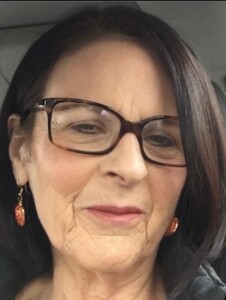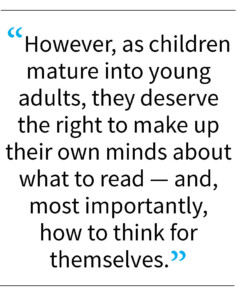Guest column by Loretta McCarty: Banned books to get spotlight at Sept. 14 Gilroy Library sale
Who decides which books get banned in the U.S. ? The answer is school boards.
![]()
By Loretta McCarty

Loretta McCarty
 Recently, I became a volunteer at the Gilroy Library bookstore, after being asked by a friend if I was interested in helping out. I was, and I did. It is something I always wanted to do, and I am now a card-carrying Friend of the Library.
Recently, I became a volunteer at the Gilroy Library bookstore, after being asked by a friend if I was interested in helping out. I was, and I did. It is something I always wanted to do, and I am now a card-carrying Friend of the Library.
A few weeks ago, during my first monthly book sale, Jo, volunteer extraordinaire, asked me to peruse the sale books and pull any banned books. I thought, “What?” I had heard about book banning in Texas and Florida but didn’t realize it was becoming more widespread. I asked her what books I was looking for, and she handed me a list of 100 books that have been given this dubious distinction.
Intrigued, I eagerly browsed the list. I was shocked by some of the titles. They included ITAL Charlotte’s Web, Captain Underpants, The Wizard of Oz, Anne Frank, Green Eggs and Ham, Harry Potter, Of Mice and Men, Huckleberry Finn, even books by the beloved author, Judy Blume. And the list went on! Banning books didn’t seem possible in 2024, so I did some research.
I learned that more than 4,000 books, 4,300 to be exact, across 23 states have been banned in the first half of the 2023-2024 school year, which is up by 65 percent from 2022. While banning books is not a new practice, this new banning is more worrisome. It is part of an ongoing American culture war, with issues related to race, gender identity, and sexuality being at the forefront.
Charlotte’s Web, a story of friendship and love, was banned due to themes of death and that the main characters are talking animals, which to some people is considered blasphemous.
 And Charlie and the Chocolate Factory has descriptions of the Oompa Loompas considered racist and the story portraying a poor philosophy of life.
And Charlie and the Chocolate Factory has descriptions of the Oompa Loompas considered racist and the story portraying a poor philosophy of life.
 The Harry Potter books were banned or challenged for reasons including religious beliefs, violence and tone. And George Orwell’s 1984, the No. 1 most banned book of all time, was targeted because it was declared pro-communist and contained explicit sexual matters.
The Harry Potter books were banned or challenged for reasons including religious beliefs, violence and tone. And George Orwell’s 1984, the No. 1 most banned book of all time, was targeted because it was declared pro-communist and contained explicit sexual matters.
The book that surprised me the most is Are You There God? It’s Me, Margaret, by Judy Blume. The classic was banned because of the way it deals frankly with religion and sexuality. Blume writes about the normal issues of an 11-year-old girl worried about getting her period, developing breasts, and starting to wear bras. Well, you cannot get much more subversive than that, right? Geez…
Basically, every book that gets banned is for sexual content, offensive language unsuited to certain age groups, and/or religious viewpoints. I read that a ban on a book is usually because some people believe the contents will cause serious harm if that information is shared with society. This seems like a stretch, since we can see all of that and more on the nightly news, sitcoms, movies, video games, and the Internet — not to mention everyday life, language and bad behavior.
So, curious, I asked Jo why she wanted me to gather these “banned” books. Her answer was perfect. She said she was planning a sale of these books to create awareness of this ridiculous notion that books should be banned. Talk about a rebel with a cause! With renewed interest, I found and pulled 10 paperbacks from the list.
I wondered who decides which books get banned in the U.S. The answer is school boards. They have broad discretion to control what material is allowed in classrooms.
 And parents have a huge say in what stays and what goes, which I can understand for young children. No one is arguing young children should be reading books beyond their level of maturity.
And parents have a huge say in what stays and what goes, which I can understand for young children. No one is arguing young children should be reading books beyond their level of maturity.
However, as children mature into young adults, they deserve the right to make up their own minds about what to read — and, most importantly, how to think for themselves.
When you think about it, just about anyone can buy a gun and kill people, which happens far too often in our schools as witnessed by the 413 school shootings since Columbine.
However, do school boards honestly think their most pressing agenda is banning books? Books such as Charlie and the Chocolate Factory, because someone interpreted the Oompa Loompas as being racist and espousing a poor philosophy of life? Come on people, get your priorities straight. Banning books sets a horrible precedent for a country claiming to be a democracy.
Loretta McCarty is a Gilroy resident and freelance writer. She wrote this column for Gilroy Life.
